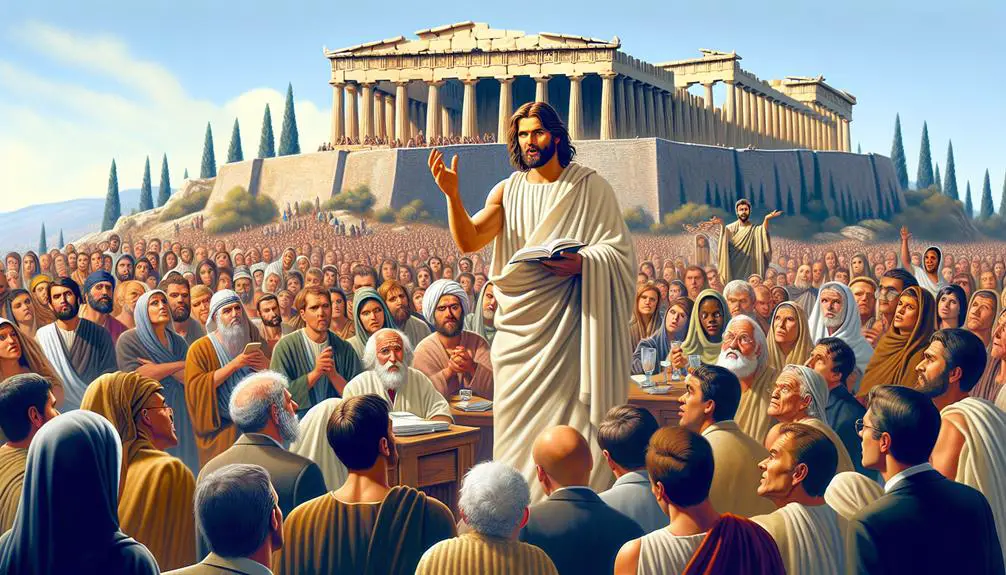Investigate how provocation shapes faith and destiny in the Bible, revealing unexpected paths to growth and revelation.

Provocation in the Bible
Throughout the narratives of the Bible, the theme of provocation emerges as a pivotal element, shaping the course of human history and divine interaction. From the earliest temptation in the Garden of Eden to the challenges faced by the apostles in spreading the Christian faith, these instances of provocation not only test faith and obedience but also serve as catalysts for growth, revelation, and sometimes, redemption.
As we explore these pivotal moments, one is compelled to ponder the multifaceted role of provocation in the biblical context and its implications for understanding faith, human nature, and the divine plan.
Key Takeaways
- Provocation often serves as a catalyst for testing faith and obedience in biblical narratives.
- Overcoming provocation can lead to spiritual growth and deeper understanding of divine providence.
- Biblical provocations highlight the tension between human weakness and the potential for divine intervention.
- Provocation in the Bible underscores the importance of resilience, repentance, and redemption in spiritual journeys.
The Temptation of Adam and Eve

The narrative of the Temptation of Adam and Eve in the Book of Genesis presents a foundational moment of provocation, encapsulating the complex interplay between free will, obedience, and the lure of forbidden knowledge. This pivotal episode delineates the human confrontation with temptation, underscored by the Serpent's deceit, leading to the commission of the Original Sin.
The Serpent, embodying cunning and duplicity, manipulates Eve with a rhetoric of enlightenment and autonomy, challenging the divine prohibition against eating from the Tree of Knowledge. This act of defiance, prompted by the Serpent's guile, marks a transgression that fundamentally alters the course of human existence.
The concept of Original Sin emerges from this narrative, signifying not only the inception of human disobedience but also illustrating the profound consequences of succumbing to temptation. The subsequent expulsion of Adam and Eve from Eden symbolizes the severance of an unmediated relationship with the divine, a theme that resonates through theological discourse.
The Serpent's deceit is pivotal, as it introduces the notion that knowledge, especially that which is forbidden, holds the power to liberate, yet simultaneously ensnare.
Analyzing this episode through a scholarly lens reveals layers of meaning regarding moral autonomy, the nature of evil, and the enduring quest for knowledge. It confronts readers with the paradoxical reality that wisdom and transgression are often interwoven, a theme that persists in various philosophical and religious debates.
The Temptation of Adam and Eve, therefore, stands as a seminal narrative that continues to provoke thought on the intricacies of human nature, ethics, and the divine ordinance.
God Tests Abraham's Faith

In a profound examination of faith and obedience, the Biblical narrative of God testing Abraham's loyalty through the command to sacrifice his son Isaac stands as a pivotal moment in theological discourse. This story, deeply embedded within the Judeo-Christian tradition, serves as a multifaceted examination of divine obedience and sacrificial love, challenging believers and scholars alike to contemplate its profound implications.
- The Command: Abraham receives a distressing command from God to sacrifice his only son, Isaac, whom he loves dearly. This command is not just a test of Abraham's faith but also a divine instruction that directly confronts the patriarch's moral and emotional bearings.
- The Journey: Abraham's resolve to obey God's command leads him and Isaac on a journey to the land of Moriah. This journey is symbolic, representing the path of utmost faith and trust in divine will, despite the incomprehensibility of the request. It is a physical manifestation of Abraham's internal struggle between his paternal love and his duty to God.
- The Intervention: At the moment of ultimate sacrifice, an angel of the Lord intervenes, providing a ram as a substitute for Isaac. This pivotal moment underscores the concept of sacrificial love and divine obedience, revealing that the test was never about Isaac's sacrifice but about Abraham's unyielding faith in God.
The narrative of God testing Abraham's faith is a compelling exploration of the dynamics of faith, obedience, and love. It invites believers to reflect on the depth of their own faith and the nature of their obedience to divine commands, making it a cornerstone of theological inquiry and spiritual reflection.
The Israelites' Wilderness Trials

Shifting our focus from the individual faith of Abraham to the collective experiences of the Israelites, their wilderness trials emerge as another profound biblical exploration of faith, obedience, and divine providence. Navigating through the arid expanse between Egypt and the Promised Land, the Israelites encountered numerous challenges that tested their reliance on God and their adherence to His commands. Among these, the manna provision and the spies' fear stand out as pivotal episodes that illustrate their fluctuating faith and God's unwavering support.
Event |
Challenge Faced |
Divine Response |
|---|---|---|
Manna Provision |
Hunger in the wilderness |
God sends manna from heaven |
Water from Rock |
Thirst in the desert |
God instructs Moses to draw water from a rock |
Golden Calf |
Idolatry and doubts about Moses' leadership |
God's anger and subsequent forgiveness |
Spies' Fear |
Fear of the inhabitants of Canaan |
God's reassurance, yet punishment for lack of faith |
The manna provision represents a direct intervention by God to sustain His people, emphasizing the theme of divine providence. Despite this miraculous support, the Israelites' faith wavered at various junctures, most notably in the incident involving the spies sent to Canaan. The fear exhibited by the spies, save for Joshua and Caleb, underscores a recurrent motif of doubt and disobedience, contrasting sharply with God's fidelity.
These wilderness trials serve not only as a testament to the Israelites' turbulent journey of faith but also as a broader allegory for the spiritual pilgrimage of believers. Through these narratives, the Bible showcases the consequences of doubt and disobedience, while reaffirming the paramount importance of trust in divine guidance and provision.
Job's Endurance of Satan's Challenges

Among the most striking narratives of faith in the Bible, Job's endurance of Satan's challenges stands as a profound examination of unwavering belief and divine justice. This story not only showcases Job's remarkable patience in the face of adversity but also delves into the deeper philosophical and theological implications of suffering's purpose. Job's patience is not merely a passive acceptance but a testament to his steadfast faith and integrity amidst severe trials.
To create imagery in the audience's mind, consider the following:
- The Initial Test: Job loses his wealth, his children, and his health, yet he refuses to curse God. This moment encapsulates the essence of Job's faith, as he remains unwavering even when all earthly blessings are stripped away.
- The Dialogue with Friends: Job's conversations with his friends offer a rich tapestry of theological debate, showcasing the complexity of understanding suffering's purpose. Here, Job's patience is further tested as he defends his integrity and explores the nature of divine justice.
- The Divine Response: The climax of the narrative, where God speaks out of the whirlwind, provides a majestic and humbling perspective on human suffering and divine wisdom. It emphasizes the limitations of human understanding and the vastness of divine knowledge.
This narrative invites readers to reflect on the nature of faith, the purpose of suffering, and the essence of divine justice. Job's endurance serves as a poignant reminder of the power of unwavering belief and the importance of seeking understanding beyond mere surface observations. Through this story, the Bible explores the depths of human resilience and the mysteries of divine providence in a world rife with challenges.
David's Provocation by Goliath

The encounter between David and Goliath in the biblical narrative presents a profound exploration of provocation and response. Goliath's taunting challenge not only tests the Israelites' resolve but also sets the stage for David's display of unparalleled courage.
This event further illuminates the battle's spiritual dimension, underscoring the complexities of faith, power, and divine intervention in human conflicts.
Goliath's Taunting Challenge
Challenging the Israelite forces with his imposing presence and defiant words, Goliath's taunts served as a significant provocation that ultimately led to his confrontation with David.
The narrative underlines not just the physical disparity between David and Goliath but also emphasizes the psychological warfare waged by Goliath through his giant's defiance and Philistine arrogance. This encounter vividly illustrates:
- The towering stature and menacing armor of Goliath, embodying the Philistine threat.
- Goliath's derisive challenge to the Israelites, intended to demoralize and intimidate.
- The sheer audacity of Goliath's demand for a single combatant to decide the conflict, underscoring his confidence in victory.
In this context, Goliath's provocation is not merely physical but deeply psychological, aiming to shatter the morale of the Israelites before the actual combat began.
David's Courageous Response
In response to Goliath's daunting provocations, David's decision to confront the Philistine giant epitomizes a remarkable display of courage and faith, setting the stage for one of the most iconic duels in biblical narrative.
Despite the palpable fear that Goliath's size and reputation instilled in the Israelite army, David, leveraging his shepherd's skills, confidently stepped forward to challenge the giant. This act not only displayed his unwavering faith but also highlighted a profound understanding of his own capabilities.
David's approach to Goliath's provocations was not merely a physical confrontation but a testament to his strategic thinking and ability to turn seemingly insurmountable odds into an opportunity for victory, thereby transforming his underdog status into a symbol of divine providence and resilience.
Battle's Spiritual Dimension
Building on David's courageous response to Goliath's provocations, it is essential to explore the underlying spiritual dimension that characterized their confrontation. This encounter transcends mere physical combat, embodying a profound narrative of spiritual warfare and faithful resilience.
- David's unwavering faith: Amidst towering threats, David's reliance on divine strength epitomizes the essence of spiritual warfare.
- Goliath's defiance: His challenge was not only against Israel but also a direct affront to their God, framing the battle as a cosmic conflict.
- The battle's outcome: Symbolizes the triumph of faith and God's sovereignty over earthly powers and intimidation.
Through this lens, David's victory serves as a testament to the power of faithful resilience in overcoming spiritual adversaries, offering deep insights into the nature of spiritual warfare in biblical narratives.
Jonah's Reluctance and Redemption

Amidst the narrative of the Book of Jonah, the protagonist's initial reluctance to fulfill God's command unfolds into a profound story of redemption and divine mercy. Jonah's hesitation to prophesy against Nineveh, a great city known for its wickedness, sets the stage for a series of events that highlight human defiance against divine will, and ultimately, the possibility of redemption through repentance.
The sea's storm, a direct consequence of Jonah's attempt to flee from God's command, symbolizes the turmoil and chaos that often accompany a refusal to adhere to divine directives. This tempest not only serves as a physical manifestation of Jonah's internal conflict but also acts as a catalyst for the eventual repentance and transformation of both Jonah and the Ninevites.
The heart of this narrative pivots on Nineveh's repentance, an element that showcases the overarching theme of mercy within the biblical text. Despite Jonah's initial disobedience, God's compassionate response to Nineveh's collective change of heart demonstrates the boundless capacity for forgiveness inherent to the divine character. This pivotal moment in the story emphasizes the potential for redemption even in the face of overwhelming wickedness, highlighting a fundamental biblical principle: repentance can alter one's destiny.
Jonah's journey from reluctance to redemption encapsulates a powerful message of divine mercy and human responsibility. It underscores the notion that while defiance against divine command can lead to chaos and turmoil, as illustrated by the sea's storm, sincere repentance paves the way for salvation and renewal. Through Jonah's story, the biblical narrative affirms the transformative power of divine grace, offering hope and redemption to all who seek it.
Jesus Challenges Religious Authorities

In examining the interaction between Jesus and the religious authorities of His time, two significant instances stand out: the Temple Cleansing Incident and His use of parables as a form of critique. These actions not only underscore Jesus's willingness to confront and challenge the prevailing religious norms but also highlight His innovative approach to teaching and provocation.
Through these acts, Jesus initiated a crucial dialogue on the nature of authority, piety, and worship in a religious context that resonated deeply with His contemporaries and continues to be a point of scholarly discussion.
Temple Cleansing Incident
One of the most significant acts of provocation against the prevailing religious authorities by Jesus is the Temple Cleansing incident, where he vehemently challenged the commercialization of sacred spaces. This event not only critiqued the market dynamics within a place of worship but also underscored the cleansing significance of this act in restoring the temple's sanctity.
- Market Dynamics: Jesus confronted the transformation of religious practice into an economic transaction, emphasizing a deviation from spiritual devotion.
- Cleansing Significance: The act symbolized the purification of a space meant for prayer and worship, free from worldly corruption.
- Challenging Authority: By taking such a bold stance, Jesus directly questioned the integrity of the religious leaders and their complicity in the temple's desecration.
Parables as Critique
Moving beyond the physical action in the Temple Cleansing incident, Jesus also employed parables as a subtle yet profound means of critiquing the religious authorities of his time. These stories, rich in metaphorical meaning, served as a form of social critique, challenging the leaders' interpretations and implementations of religious laws and principles.
The parables, by nature, required contemplation and insight to unravel, positioning Jesus not just as a critic but as a teacher inviting reflection on deeper moral and spiritual truths. Through this method, Jesus effectively illuminated the discrepancies between the religious authorities' practices and the core values they were supposed to uphold, urging a return to genuine faithfulness and compassion over legalism and hypocrisy.
Paul's Confrontations in His Ministry

Throughout his ministry, Paul frequently encountered confrontations that tested both his faith and his resolve in spreading the Christian message. These confrontations, while challenging, served to strengthen the early Christian community and underscored the transformative power of the Gospel.
One significant aspect of Paul's ministry that often provoked confrontation was his outreach to the Gentiles, a mission that marked a pivotal shift in the early Christian movement. In partnership with Silas, Paul embarked on journeys that would bring the message of Christ beyond the Jewish communities and into a broader, more diverse audience. This strategic outreach sparked significant debate and opposition among early believers, who were grappling with the inclusion of Gentiles in a faith that had its roots in Judaism.
To create imagery in the audience's mind, consider the following scenarios:
- Gentile Outreach: Imagine Paul, standing in the marketplace of a bustling Gentile city, preaching the Gospel to curious onlookers. This scene illustrates the boldness of Paul's mission to extend the Christian message beyond its Jewish origins.
- Silas Partnership: Visualize Paul and Silas, bound in chains, singing hymns in a Philippian jail. Their partnership not only symbolizes solidarity but also the unbreakable spirit of those committed to spreading the Christian faith despite persecution.
- Council of Jerusalem: Picture the heated debates at the Council of Jerusalem, where Paul argued passionately for the inclusion of Gentiles without the requirement of circumcision. This moment highlights the theological and cultural tensions within the early church regarding the scope of God's salvation.
These confrontations, while fraught with difficulty, ultimately contributed to the expansion and diversification of the early Christian church. Through analytical examination, Paul's encounters reveal a narrative of perseverance, inclusion, and the transformative power of faith.
Frequently Asked Questions
How Does the Concept of Provocation in the Bible Relate to Modern-Day Personal Challenges and Temptations?
The concept of provocation, when analyzed in contemporary terms, reveals significant parallels with modern-day personal challenges and temptations. These scenarios test an individual's spiritual resilience, eliciting a spectrum of modern reactions ranging from steadfastness to vulnerability.
The analytical exploration of such provocations offers insight into the enduring human struggle against external and internal stimuli, underscoring the necessity for cultivating a resilient spiritual core to navigate life's multifaceted provocations.
Are There Examples of Provocation in the Bible That Led to Positive Outcomes or Personal Growth for the Characters Involved?
In exploring instances of challenge and transformation, two emblematic narratives stand out: Joseph's Dreams and Peter's Denial. These narratives illustrate how adversities can catalyze profound personal growth.
Joseph's ordeal, precipitated by his dreams, eventually positions him as a pivotal figure in Egypt, while Peter's denial of Christ, a moment of profound personal failure, becomes a cornerstone for his development as a leader in the early Christian church.
How Do Different Biblical Translations Interpret the Term "Provocation," and Does It Significantly Alter the Meaning of the Passages?
The interpretation of 'provocation' varies across different biblical translations, impacting the passages' meanings significantly. Analyzing translation accuracy involves examining the original Hebrew and Greek texts, comparing them to contemporary versions.
It's crucial to consider the cultural context of the words used during the period of writing, as this sheds light on the nuanced meanings that might be lost or altered in translation.
This analytical approach respects the depth and complexity of the biblical text.
In Contexts Outside of Direct Testing by God or Confrontation, How Is Provocation Subtly Addressed or Symbolized in Biblical Narratives?
In exploring subtle forms of provocation, narratives often reveal silent challenges against cultural norms. These instances, though not direct confrontations or divinely orchestrated tests, serve as pivotal moments of character development and thematic exploration.
How Can the Study of Provocation in the Bible Help Individuals Navigate Conflicts and Provocations in Contemporary Religious Communities or Societies?
The study of historical narratives offers profound insights into conflict resolution and fosters community empathy, akin to deciphering a timeless allegory.
Analyzing such themes within religious texts, especially regarding provocation, equips individuals with strategies to navigate contemporary disputes in religious communities or broader societies.
This scholarly approach promotes understanding, tolerance, and effective communication, crucial for maintaining harmony and respect in diverse societal and religious landscapes.
Conclusion
In conclusion, the theme of provocation within the biblical narrative serves as a multifaceted tool for exploring faith, obedience, and redemption. These stories, from the temptation of Adam and Eve to Paul's confrontations in his ministry, highlight the complexities of human nature and divine interaction.
An interesting statistic to note is that among religious scholars, there is nearly a unanimous agreement that these provocations are essential for understanding the development of faith characters within the Bible, emphasizing their universal significance across various traditions and interpretations.



Sign up